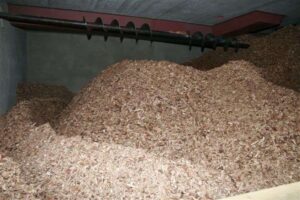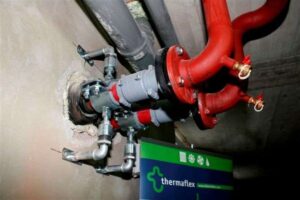 In Slovenia there are a number of opportunities in the market for renewable energy, energy efficiency and environmentally friendly technology. Three Austrian companies started a joint pilot project for a micro-network, using biomass in Hoce.
In Slovenia there are a number of opportunities in the market for renewable energy, energy efficiency and environmentally friendly technology. Three Austrian companies started a joint pilot project for a micro-network, using biomass in Hoce.
Micro-networks are becoming an effective, cheap and clean way to meet local energy needs. The costs associated with a dependence on fossil fuels such as oil and gas has led to the increased use of domestic resources for energy production. This dependence is lifted with domestic networks that use sustainable energy instead. So the construction team for a new pizzeria decided to heat the building using energy from biomass, and connecting neighbours to the heating network.
Details
 The micro network’s heating station, and a wood chip bunker with an output of 300 kW was installed in the basement of the pizzeria. Between the boiler and the heating distributor, a battery with three 2,000-litre storage tanks was installed. A local installer installed the complete weather-controlled micro power plant.
The micro network’s heating station, and a wood chip bunker with an output of 300 kW was installed in the basement of the pizzeria. Between the boiler and the heating distributor, a battery with three 2,000-litre storage tanks was installed. A local installer installed the complete weather-controlled micro power plant.
The heating network itself consisted of five parts: the district heating supply line for the neighbouring houses with a total of 240 kW and a temperature level of 85/65° C (this consisted of a connected pet store with 160-170 kW, a residential building with 25-30 kW, a second house with 20 kW, and four to five more planned houses), the circuit for the pizzeria with 25 kW and a temperature level of 75/55° C, a circle of 25 kW and a temperature level of 75/55° C for an apartment that is located on the upper floor of the pizzeria, the boiler circuit with 300 l hot water tank, and a reserve strand.
Goals
 The main goal was to collectively combine our expertise, and introduce a complete solution for a micro-power and heat supply. In this market it is increasingly important that all stakeholders are well coordinated in order to achieve the best possible output for costumers. Besides effective coordination, skilled project management would be the key to success in creating an effective and sustainable micro-network for local energy needs.
The main goal was to collectively combine our expertise, and introduce a complete solution for a micro-power and heat supply. In this market it is increasingly important that all stakeholders are well coordinated in order to achieve the best possible output for costumers. Besides effective coordination, skilled project management would be the key to success in creating an effective and sustainable micro-network for local energy needs.
To ensure the effectiveness of the local heating system, special technical requirements had to be met, particularly in the distribution of heat. Flexibility was the key factor for ensuring a simple, smooth and quick installation.
Results
As the owner of the pizzeria also worked as a farmer with an own forest, he was able manufacture and supply the necessary biomass in the form of wood chips. For the entire network the annual consumption was around 450 m³.
The project was kick-started in November 2008, and by December of the same year they had already begun to deliver heat. Within the first three to four months 110,000 kWh of cheap energy could be sold to the local users.
Source: Thermaflex